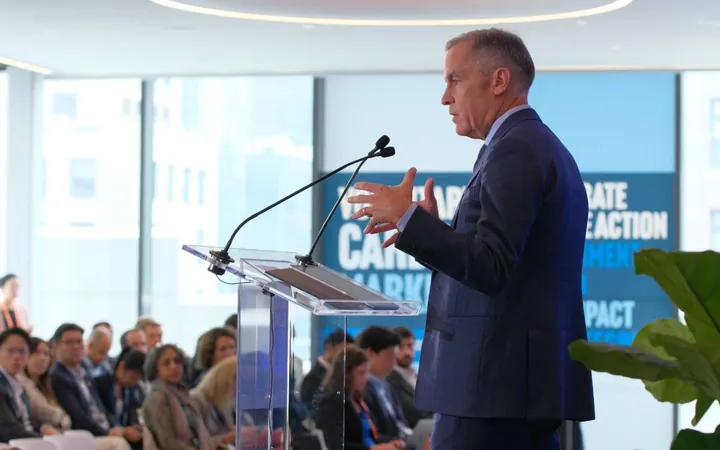
The Financial Fantasy of Mark Carney Crumbles Amid Political Shifts
2025-01-07
Author: Emma
Mark Carney's Vision Unravels
Mark Carney's vision for a global financial system embracing net zero principles may be unraveling before our eyes. For much of the past few years, Carney, a prominent figure in climate finance and former Governor of the Bank of England, championed the Net Zero Banking Alliance (NZBA). Established in April 2021 under the auspices of the United Nations, the NZBA aimed to align banking practices with the ambitious goal of achieving net zero greenhouse gas emissions by 2050. However, recent trends reveal a stark reality: major banking institutions are re-evaluating their commitments.
Withdrawal of Major Financial Institutions
Leading financial giants such as Goldman Sachs, Wells Fargo, Bank of America, Morgan Stanley, and Citigroup have distanced themselves from the NZBA. This exit raises serious questions about the sustainability of the alliance without these significant players. The current political climate, including the possibility of Donald Trump’s return to the presidency, has intensified this withdrawal. Trump’s unequivocal support for fossil fuels and his pro-drilling stance are in direct opposition to the NZBA's objectives, adding another layer of complexity to the ongoing climate finance debate.
Criticism of Carney's Approach
Even before the U.S. election heated up, discontent with the NZBA was evident. Critics of Carney's approach argue that his promises of profitability through green investments were misguided. Businesses adopting these so-called "woke" policies in the name of sustainability are reportedly suffering significant financial losses, making it clear that prioritizing ESG considerations over traditional profitability may not be a viable long-term strategy. The backlash against such policies has grown as more voices, once labeled as dissenters, prove to be correct in their skepticism.
Political Developments in Canada
In a related political development, Canadian Prime Minister Justin Trudeau has announced his intention to step down from his position. His departure coincides with troubling times for Canada, marking a tumultuous chapter that critics say prioritizes party politics over national interests. Speculation surrounds the potential shift in leadership within the Liberal Party, with Carney rumored to be a contender. However, his financial track record—especially the recent setbacks following the NZBA's declining influence—sparks concerns about his ability to steer Canadian policy effectively.
Global Repercussions of Climate Initiatives
Globally, the repercussions of prioritizing climate initiatives over practicality are beginning to surface. With trillions wasted on initiatives lacking tangible results, the imperative to redirect funds toward poverty alleviation and public welfare is becoming more pronounced. Historical data suggests that improving the economic circumstances of individuals correlates with better environmental stewardship. In light of these revelations, the narrative that wealthy nations can impose expensive climate policies on poorer ones without addressing foundational economic challenges is increasingly being challenged.
Reassessing Climate Ambition and Economic Realities
As Canada contemplates its next political move in the wake of Carney’s mixed legacy and Trudeau’s looming departure, it is critical to scrutinize the implications of these shifts. With the collapse of efforts like the NZBA, the message becomes clear: the time for reassessing the balance between climate ambition and economic realities is now. Those who previously warned that “go woke, go broke” may have been prescient, and their insights deserve serious consideration in the years to come.



 Brasil (PT)
Brasil (PT)
 Canada (EN)
Canada (EN)
 Chile (ES)
Chile (ES)
 Česko (CS)
Česko (CS)
 대한민국 (KO)
대한민국 (KO)
 España (ES)
España (ES)
 France (FR)
France (FR)
 Hong Kong (EN)
Hong Kong (EN)
 Italia (IT)
Italia (IT)
 日本 (JA)
日本 (JA)
 Magyarország (HU)
Magyarország (HU)
 Norge (NO)
Norge (NO)
 Polska (PL)
Polska (PL)
 Schweiz (DE)
Schweiz (DE)
 Singapore (EN)
Singapore (EN)
 Sverige (SV)
Sverige (SV)
 Suomi (FI)
Suomi (FI)
 Türkiye (TR)
Türkiye (TR)
 الإمارات العربية المتحدة (AR)
الإمارات العربية المتحدة (AR)